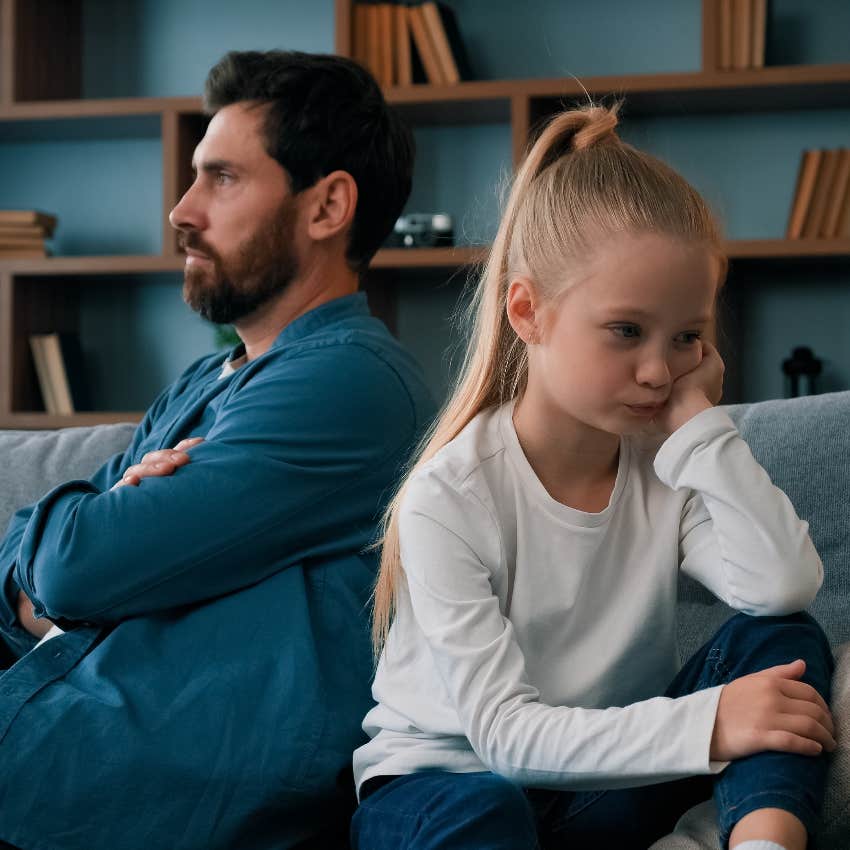Mom Notices That Her Husband Acts As If Their Daughters 'Barely Exist' After Her Son Was Born
When parents play favorites, it hurts all their children.
 Lopolo / Shutterstock
Lopolo / Shutterstock The way a family operates has a direct effect on how kids grow up to see themselves and their place in the world. Families are our first relationships, molding our core values and how we relate to others later in life.
When parents display favoritism, it can cause very real harm to their children — both the ones who are picked as favorites and the ones who aren’t.
One mom noticed that her husband acts like their daughters ‘barely exist’ since having a son.
The 49-year-old mother wrote into the subreddit r/relationshipadvice, wondering how to navigate an emotionally complicated situation involving her 54-year-old husband and their 6 kids.
The Redditor explained that she and her husband have been married for 24 years. Together, they have five daughters between the ages of 20 and 9 and one son, who’s 6.
She started her post by acknowledging what should have been a red flag at the start of their marriage, saying, “I remember him saying, ‘If our first child is a boy, we're done having children because that's all I need.’”
The mom justified his overtly misogynist statement by saying, “My husband was a very good basketball player in high school and college, and so I understood why he would have preferred a son.”
She noted that when the couple first started having kids, “It seemed like he made an active effort to be the most supportive, perfect, and loving husband.” Yet after their son was born, her husband began ignoring their daughters and focusing all his energy and attention on their son.
 NDAB Creativity / Shutterstock
NDAB Creativity / Shutterstock
The mom shared that she noticed the change “pretty much immediately after our son was born,” saying he acted like “Our daughters barely existed.”
“His effort of being the supportive, engaged, and active father [and] husband shifted from our daughters and went 100% to our son, and now I know for a fact that our daughters also noticed it,” she explained.
Their 17-year-old daughter initiated a conversation with her in which she revealed how hurt she was by her father’s inconsistency. The teen expressed feeling “abandoned” because her dad “treats her like a stranger” and “never asks about her.”
“Apparently, our other daughters feel the same way [and] have been talking about it with each other,” the mom added.
The mom revealed that she ‘might have been in denial’ about how damaging her husband’s lack of attention has been for their daughters.
She mentioned her conversation with her daughter to her husband, who “blew it off as her being an ‘emotional teenager,’” which should have been another red flag, as he refused to validate his child’s emotions.
“This is a situation I don't even know how to begin to get a handle on,” the mom wrote. “Does anyone know where I should even start?”
As psychologist Dr. Becky Kennedy explained, a parent’s favoritism harms all children within a family.
“Favorite children grow up and tend to feel a lot of pressure,” she said. “They remember feeling like, ‘Oh, I had to be good all the time.’ Non-favorite children tend to feel like they were never given the benefit of the doubt.”
People in the comments let the mom know exactly how her husband’s behavior was damaging their daughters and their son.
“This was just misogyny the whole time,” one commenter noted. “He could have been just as involved in their lives through their hobbies, including introducing them to basketball.”
“Your husband is a classic misogynist,” another user agreed. “You’re showing your daughters that this is acceptable treatment by staying.”
Another Redditor noted that this moment was a clear line in the sand, saying, “It's time to decide. Do you empower your girls? Do you rescue all of your children from his patriarchal [expletive]? Or do you wait for them to have to heal from their childhood when they're adults?”
They explained that while she can’t change her husband, she can change the outcome of her children’s current reality. They recommended seeing a licensed family therapist yet warned her not to expect her husband to go along on the journey.
“He is highly unlikely to come around and see either you or your daughters as fully realized humans who deserve his attention and love,” they said. “Your best shot is to start making changes yourself.”
“Stand up for your kids,” someone else wrote, recommending she have a serious discussion with her husband. “If he refuses to change his behavior with the girls, then it’s time to reconsider your marriage. The emotional damage he is inflicting on all the kids, including your son, is unacceptable.”
Therapist Jeff Guenther spoke directly to non-favorite kids, describing the lasting psychological effects caused by emotional neglect.
“The non-favorite child will have a higher likelihood of experiencing low self-worth and low self-esteem, feelings of inadequacy or never measuring up, prone to giving up on things because why does anything matter, [and] an independent outlook on life which could lead to isolation and feeling lonely,” he explained.
Guenther also shared that the non-favorite child will likely feel resentment towards the favorite child and have a higher likelihood of experiencing depression throughout their life.
He emphasized how important the parent-child relationship is, explaining that it “sets the foundation and expectations of future relationships." For the non-favorite child, "intimacy issues related to feeling not good enough … could occur in romantic relationships.”
 MAYA LAB / Shutterstock
MAYA LAB / Shutterstock
The first step to making any change is recognizing that an issue exists, as this mother seems to have done. Her next steps could easily define the trajectory of how her daughters see themselves and whether they believe they’re worthy of love and support.
There’s no easy solution in this mom’s situation, yet prioritizing all of her kids' needs will likely benefit the family as a whole and give them a chance for a healthy and well-adjusted future.
Alexandra Blogier is a writer on YourTango's news and entertainment team. She covers social issues, pop culture, and everything else related to the entertainment industry.

